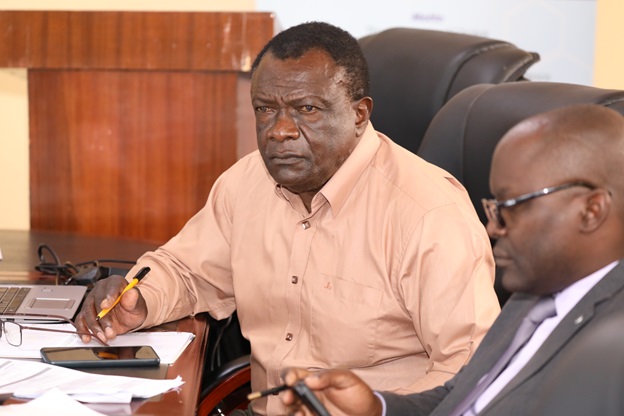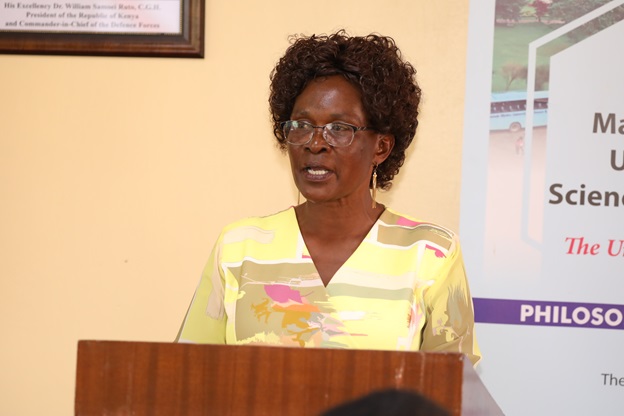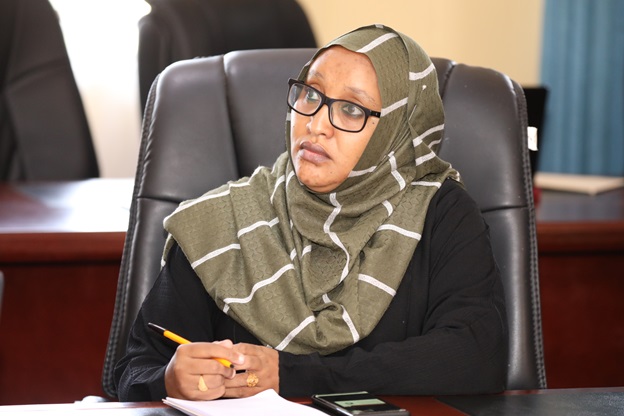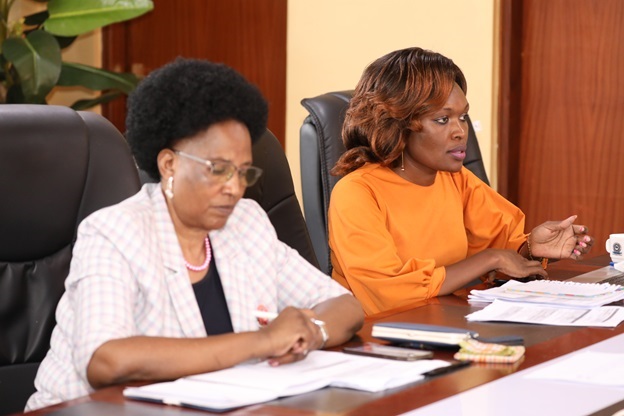Prof. Josephine Ngaira and Dr. Tecla Sum during the conference.
MMUST researchers have deliberated on the relationship between climate change, security, and governance in an effort to ensure sustainable and secure futures. This was during the 16th Multi-disciplinary conference that was held at the Vice Chancellor’s Boardroom, with the aim of highlighting the impacts and responses to climate change.
The Western Region Police Commander, Mr. Paul Kiprono Langat, in his presentation ‘Climate Change and Human Conflicts’, noted that climate change is a global issue and in as much as conflicts exacerbate the effects of climate change, climate change indirectly, drive conflict. He added that there is a need for concerted efforts in order to mitigate the adverse climate effects including greenhouse emissions, adapt to changing conditions as well as build resilience in our communities and ecosystems.
“Human conflicts entail physical altercation between members of different communities often sharing resources within a common geographical area, or where one community on migrating to another, interferes with the livelihoods of the other community. As the climate crisis intensifies, more people will be forced to leave their homes, and many countries will not be in a position to cope with this influx of refugees including sharing of already scarce resources,” he said.

Prof. Harrison Tsingalia following on proceedings of the conference.
Further, Mr. Langat urged the people to consider environmental interventions, such as the need to rejuvenate the environment through afforestation, re-afforestation, and protection of key water towers, as this will guarantee an increased food, water and pasture availability hence dissipating human conflicts.
Esri Eastern Africa member, Ms. Joyce Siundu presented on ‘Monitoring Climate Change’. She explained how GIS is applying the geographic approach by creating more focused solutions such as promoting biodiversity, restoring nature, improving decision-making, improving public transit, promoting resilient infrastructure, responding to epidemics, and reducing pollution to reduce the impact of climate change.
“Geographic approach provides a framework for understanding and applying our knowledge in an inclusive and multi-disciplinary process impacting every sector of the society. This approach also establishes a mutual relationship among individuals, organizations, and communities, which breaks barriers and enables sharing of geographical knowledge, and creates a nervous system for the SDGs. The time to act is now, let us embrace our biggest challenges, envision what is possible, learn and communicate, share and collaborate, design and plan our future”, she said.
According to the Director of Resource Surveys and Remote Sensing, Dr. Moses Akali, Kenya is vulnerable to the impacts of climate change because it has fewer resources to adapt socially, technologically, and financially. He, however, noted that the government has given adaption options a high priority in embracing geographical techniques and providing indispensable options for making more accurate assessments and estimates, predicting future trends more reliably, and devising more optimized climate change adaption and mitigation plans. “Vulnerability depends on exposure, scrutiny, and adaptive capacity as adopted by IPCC, looking at the sub-factors that drive exposure sensitivity and adaptive capacity using geospatial tools,” he added. The renowned researcher revealed these as he discussed the deployment of technology for climate change-induced disasters.

The Director, DIAL- Dr. Catherine Aurah speaking at the conference.
Mr. James Metto from the Kenya Electricity Generating Company focussed on Renewable energy for climate change mitigation. He emphasized the fact that climate change has become the biggest global environmental challenge, which has led to more extreme weather patterns, diminishing water resources, and falling crop yields.
Relating to the energy sector, Mr. Metto confirmed that Kenya has indeed been affected. “In Kenya, energy generation has been adversely affected by climate change. In the 1990s Kenya faced power generation challenges due to reduced river flows to our hydro dams caused by prolonged droughts, associated with climate change. This leads to a change of power generation strategy by the country, with more focus on geothermal, wind, and solar energy. There is a need for all African countries to have access to secure, affordable, and reliable energy that will enable Africa to industrialize, improve its services, and reduce poverty.”

Dr. Umulkher Ali Abdillahi following a presentation during the workshop.
Additionally, he commended Kenya for making significant strides in realizing the objectives of sustainable development goal 7 of ensuring access to affordable, reliable, sustainable, and modern energy for all, particularly access to electricity.
Other presentations made include Climate Change and Communication by Prof. Aran Stibbe from the University of Gloucestershire; Climate Change and Language by Dr. Chris Wasike from MMUST, The Place of Creative Arts in Communicating Climate Change; Technology and Climate Change by Prof. Franklin Wabwoba; Green Technology for Climate Change Mitigation by Dr. Tom Musili; E-Waste Management for Safe Environment by Dr. Moses Akali; Director Resource Surveys and Remote Sensing, Deployment of Technology for Climate Change Induced Disasters; Climate change and environmental protection: Dr. Patricia Mwangi from Kenyattta University; Developing Smart Cities to Combat Climate Change by Prof. Josiah Munda from Tswane University of Technology; Renewable energy contribution in climate change mitigation; Climate change and security by Prof. Mary Abukutsa from Jomo Kenyatta University of Applied Technology; Smart Agriculture for Food Security by Prof. Johanna Jacobi from ETH Zurich and Agroforestry, Agro Ecology and Climate Change.
By Milicent Masitsa and Sylvia Shibutuli





